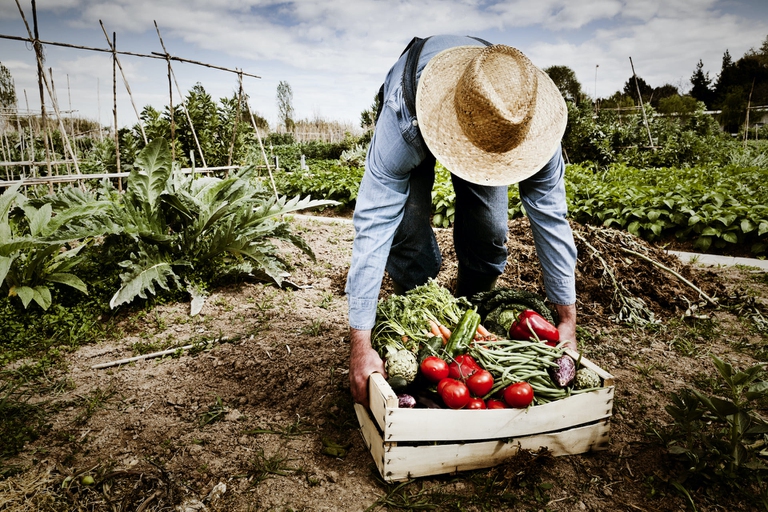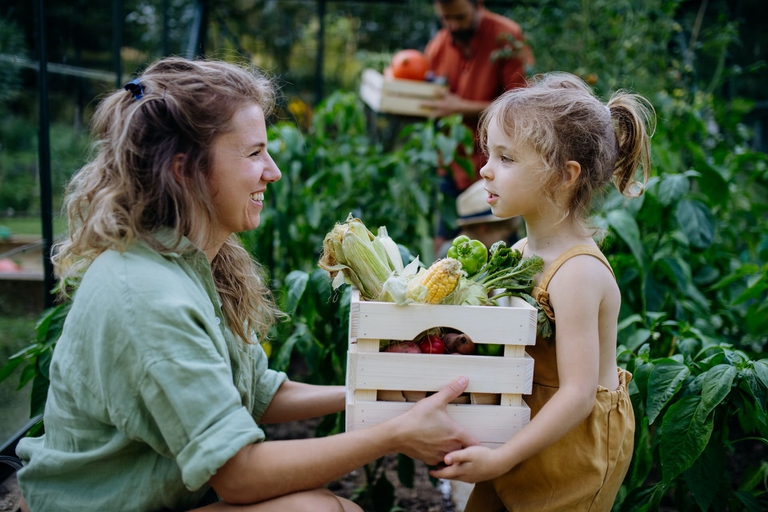
Immunologist Attilio Speciani explained his views on the new US food pyramid, offering an analysis of the guidelines and the influence of lobbying.
Made in Nature is a project funded by the European Union and Cso Italy to promote the benefits of organic food consumption for our health and that of the environment.
Europe and Italy are going through a period of particular growth in the organic farming industry. Over the past five years, the organic industry has seen a remarkable increase, becoming one of the key sectors of sustainable economy. According to the latest Bio Bank report, organic sales in the 48 countries of the European continent reached 52 billion euros in 2020, an increase of 15.6 per cent in 2019 and an impressive 144 per cent increase since 2011.
Not only Italy is confirmed as the sector leader in Europe, but also globally. With a turnover of 2.6 billion euros in exports, Italy boasts the highest number of organic producers in Europe with more than 71,500 farms. Also, it ranks third in Europe and sixth worldwide in both retail sales and organic farmland.
Such data highlights how, besides being an ethically sustainable method of cultivation for our Planet, organic farming is more and more an economically advantageous choice for companies, offering significant opportunities for growth and development. Further confirmation of this trend comes from Nomisma Sana 2023 Observatory‘s data, which reveals how the organic sector attracts an ever-increasing number of operators. In fact, the market evolution has seen in recent years a strong expansion of supermarkets and large retailers, which have practically doubled their presence as distribution players in the last decade, at the expense of specialty stores, which, on the other hand, have suffered a 15 per cent decrease since 2013.
Despite this change reflects greater accessibility to organic products, new concerns are emerging, including those related to the greenwashing phenomenon and the possible departure from the core principles of health, sustainability and equity that have always characterized organic farming.
Nomisma found out that in 2022, organic food sales in the Italian market accounted for 4 percent of organic retail sales worldwide, testifying the increased interest in organic products among Italian consumers. However, it also showed that nearly 90 percent of consumers want more in-depth information about the products they buy, especially when it comes to organic. In response to this very need for greater clarity and transparency, the Made in Nature project was born.
Carried out by Cso Italy, funded by the European union and participated in by companies Brio, Canova, Ceradini, Conserve Italia, Orogel and Verybio, the project is committed to bringing to light the benefits of organic farming, enhancing the importance of agricultural practices that contribute to our health and that of the Planet.
“Although the purchase of organic fruit and vegetables in the first quarter of 2023 showed a drop of 7 percent in 2022, the number of Italian households moving closer to organic produce, allowing an important growth, is not decreasing. Italy is, after all, among the top European countries in terms of organic farmland with 22,000 square kilometers, equal to the area of the entire Emilia Romagna region (data Organic farming in the Eu from the Commission),” said Elisa Macchi, the General manager of Cso Italy. “The Made in Nature project, now in its sixth year, is important because it has two goals: to strengthen awareness and recognition of the union’s quality regime for organic production and to increase the competitiveness and consumption of Eu organic agricultural products. The actions we have put in place are helping us to achieve the goals we have set: increasing the level of knowledge of the values of the European organic certificate by 24 percent among women consumers and responsible buyers between the ages of 18 and 55 (the target of the campaign) and an additional consumption of Eu organic fruit and vegetables of about 18 million euros.”
The importance of effective, clear and transparent communication is critical to the success of organic farming.
Through outreach and education, Made in Nature aims to improve information about organic and spread awareness among European consumers in Italy, Germany, France and Denmark,the four countries where the project is ongoing, by showing how farming practices rooted in the past can drive a more sustainable future for agriculture.
Made in Nature aims to encourage farming methods that respect the environment and promote the importance of a healthy and sustainable diet, thus improving people’s health and well-being to reduce sanitary costs due to poor nutrition which amount to 13 billion euros per year in Italy alone (according to data from Italian society of environmental medicine, Sima).
Through a series of initiatives and actions on various channels such as information campaigns in the main trade publications, communication on social network channels, including collaborations with influencers, and active participation in trade fairs, the project aims to bring more people closer to organic fruit and vegetables, breaking down the barriers of those consumers who still do not choose organic, and strengthen the choices of those who already consume organic.
Two examples of Made in Nature initiatives are a podcast called Germogli (the Italian term for “sprouts”, editor’s note) and the Frutteto zero emissioni project, a zero emission orchard. Germogli consists of a series of events to go back to the origins of organic farming and demonstrate that organic farming not only is an alternative linked to a contemporary trend, but also an authentic expression of our culinary tradition and rural cuisine of the past. A journey through which guests and experts in food and agriculture explore stories and sustainable practices that define our agricultural heritage.
The Frutteto zero emissioni project was created to balance the environmental impact of Made in Nature’s promotional activities. The programme involves the planting of fruit trees and other plants as a compensatory measure for the carbon dioxide emissions generated. In fact, the project pays special attention to choosing sustainable resources, such as using recycled paper for information materials, and reducing ecological impact through practices such as limiting air travel and combating food waste. The Zero Emissions Orchard, located at the Bologna food center, sees the annual installation of dozens of new trees, with the goal of absorbing thousands of kilograms of carbon dioxide over three years. To date, the project has already spawned numerous fruit trees.
In addition to the environmental aspects, the orchard also has a social dimension: the products are donated to Cucine popolari, a local association that provides meals to people in need, while the care and maintenance work of the orchard is managed by the social cooperative Eta beta, contributing to community development and social support.
Among future initiatives, however, Made in Nature will attend the Macfrut 2024 fair in Rimini, Italy, on 8, 9 and 10 May. The fair is aimed at both Italian and international fruit and vegetable professionals, within the entire value chain from production to marketing, including aspects such as logistics, nursery and seed production. During this event, the companies will be able to present their initiatives and developments in organic farming, encourage exchanges of best practices and explore issues related to sustainability and agricultural innovation.
Siamo anche su WhatsApp. Segui il canale ufficiale LifeGate per restare aggiornata, aggiornato sulle ultime notizie e sulle nostre attività.
![]()
Quest'opera è distribuita con Licenza Creative Commons Attribuzione - Non commerciale - Non opere derivate 4.0 Internazionale.
Immunologist Attilio Speciani explained his views on the new US food pyramid, offering an analysis of the guidelines and the influence of lobbying.
Fao has proclaimed 2026 the International Year of Women Farmers, to promote global action for gender equality and women’s empowerment in agri-food systems.
In Australia, researchers are investigating how microbes—including those found in soil—may influence emotional states and social relationships through the gut–brain axis.
With the approval of the soil directive by the European Parliament, member states have three years to establish monitoring systems and promote solutions for sustainable soil management.
Oilseeds such as walnuts, hazelnuts, and almonds have been linked in an Australian study to benefits for longevity, memory, and joint mobility.
Together with Made in Nature, we explored at the Macfrut fair in Rimini, the Italian organic fruit and vegetable market and its key players.
On the hills of Minabe and Tanabe ume fruit has been cultivated alongside oak forests and honeybees for centuries using a method now recognised by the FAO.
The revival of millet farming has been tackling malnutrition and improving the livelihoods of Kutia Kondh tribespeople in Odisha state, in eastern India.
The same tycoons who created factory farms are the ones investing in fake meat. But “real” food can’t be created in laboratories: regenerative agriculture is the only way.









